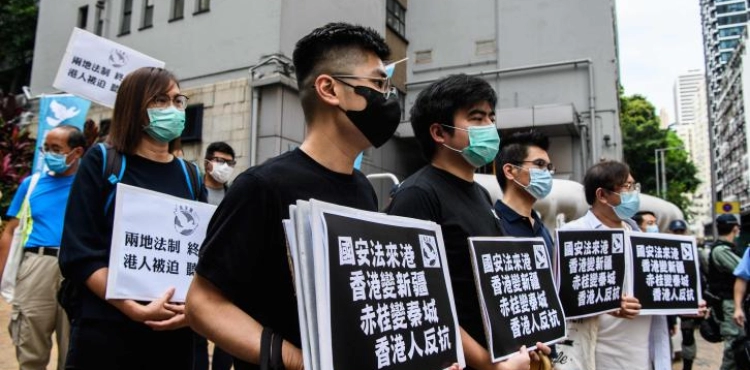Pro-democracy activists announced Friday that China´s decision to impose a law on “national security” in Hong Kong constitutes one of the worst attacks on the semi-autonomous city, and called on the population to descend To the street to pretend.
Hong Kong Chief Executive Curry Lam stressed Friday that she is ready "for full cooperation" with Beijing to implement the law on national security that the Chinese authorities intend to implement in the semi-autonomous region.
Carrie Lam, who is near Beijing, said in a statement that the law proposal "will not affect the legitimate rights and freedoms of Hong Kong residents."
The Chinese parliament’s interference in Hong Kong´s constitutional affairs was justified by the violence that occurred last year during demonstrations. "The recording of several incidents involving explosives and firearms poses the threat of terrorism," she said.
A draft law on security aimed at preventing "treachery, separation, rebellion and sabotage" was presented Friday morning at the opening of the annual session of the People´s National Assembly.
The text comes after repeated warnings from the Chinese Communist regime of any defection in Hong Kong that was rocked last year by massive pro-democracy demonstrations that lasted seven months.
"I would just like to say to the international community that this will be the end of Hong Kong," said pro-democracy representative Dennis Kwok from Hong Kong Thursday evening, accusing Beijing of "breaking its promise."
Britain returned Hong Kong to China in 1997 under an agreement guaranteeing the former colony autonomy and freedoms for fifty years in accordance with the principle of "one country, two systems".
Pro-democracy activist Joshua Wong said the message China sent to the opposition demonstrators was very clear. "Beijing is trying to silence by force and fear the voices of opponents of Hong Kong residents," he wrote on Twitter.
Soon, calls for demonstrations spread by the pro-democracy movement and the applications used by the pro-democracy movement.
The Beijing announcement could inflame Hong Kong residents after calm for months, due to measures taken to halt the outbreak of the new Corona virus.
A message on the Telegraph application called for the gathering Sunday, "Hong Kong residents have one choice over their future." Last year, a pro-democracy movement rocked the former British colony that Beijing was seeking to tighten grip on.
Activists say that should the law be passed, it would be one of the most significant violations of freedoms in Hong Kong since 1997.
"Beijing does not respect the people of Hong Kong at all," said Tania Shan, a pro-democracy advocate in Hong Kong. "Many Hong Kong residents are angry today just like us, but we have to remember that we should not give up."
On Thursday evening, when the bill was announced, no details were released, and only mentioned that it would strengthen "enforcement mechanisms" in the area of ​​"protecting national security."
Article 23 of the Basic Law, used two decades ago as a constitution for Hong Kong, stipulates that the region have a law prohibiting "treason, separation, rebellion and sabotage." But the clause was never applied because much of Hong Kong´s residents see this as a threat to their freedoms.
The last attempt to implement Article 23 in 2003 failed due to the massive demonstrations in the streets of Hong Kong, which is 7.5 million people.
Joshua Wong and other activists stress that Beijing´s decision made the Chinese parliament to pass the law a way to circumvent the Hong Kong parliament.
"Any attempt to impose a law on national security that does not reflect the will of Hong Kong residents will destabilize and the United States and the international community will condemn it," said State Department spokesman Morgan Ortagos.
In response to a question on the subject, President Donald Trump said that if that happened, Washington would respond "firmly."
On Thursday, US Senators introduced a bill to impose sanctions on any entity that would limit Hong Kong´s autonomy.
Chris Patten, the last British governor of Hong Kong, before returning to China in 1997, said the proposal was "a great detriment to the city´s autonomy (...) and very harmful".












